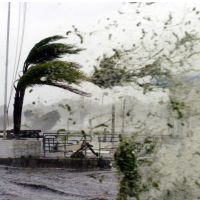Hurricanes with Female Names Cause more Deaths than those with Male Names
 Hurricane Jeanne in 2004 (photo: Ricardo Ramirez Buxeda, Orlando Sentinel/AP)
Hurricane Jeanne in 2004 (photo: Ricardo Ramirez Buxeda, Orlando Sentinel/AP)
A hurricane by any other name is still a hurricane, capable of inflicting immense destruction and harm. But many Americans don’t take them as seriously when bearing female names, according to university researchers, which has resulted in these storms being more deadly than those named after men.
Experts at the University of Illinois at Urbana-Champaign reviewed the death tolls of hurricanes striking the United States from 1950-2012 (with the exclusion of Hurricane Katrina in 2005 and Hurricane Audrey in 1957 because they were more deadly than typical storms). Their analysis showed that the ones named after women killed more people than their male-decreed counterparts, even when the hurricanes were equal in strength. “Our model,” wrote the authors of the study, “suggests that changing a severe hurricane’s name from Charley…to Eloise…could nearly triple its death toll.”
The fact that hurricanes with female names are perceived—by both men and women—as being less dangerous results in people taking less protective measures when those hurricanes strike. Consequently, more deaths occur.
The researchers also interviewed Americans and asked them to compare the threats of storms with names like Christina versus Victor and found respondents judged the former to be less worrisome.
“In judging the intensity of a storm, people appear to be applying their beliefs about how men and women behave,” Sharon Shavitt, a professor of marketing at Illinois and a co-author of the report, said in a Illinois university press release. “This makes a female-named hurricane, especially one with a very feminine name such as Belle or Cindy, seem gentler and less violent.”
Hazel Rose Markus, a professor in behavioral sciences at Stanford University, who was not involved in the research, called the research “a tremendously important finding. Proof positive that our culturally grounded associations steer our steps.”
“The problem is that a hurricane’s name has nothing to do with its severity,” Kiju Jung, the study’s lead author, told the University of Illinois News Bureau. “Names are assigned arbitrarily, based on a predetermined list of alternating male and female names. If people in the path of a severe storm are judging the risk based on the storm’s name, then this is potentially very dangerous.”
Critics dismissed the study, noting that all hurricanes were given female names from 1953 through 1978. It wasn’t until 1979 that the government began alternating between masculine and feminine names for the storms. Given this history, some detractors said the preponderance of “womanly” hurricanes was bound to skew the results.
The Illinois researchers defended their results, saying they focused on the masculinity and femininity of hurricane names, including those during the period when they were named after women only. Case in point: Bertha sounds less female-like than Laura.
-Noel Brinkerhoff
To Learn More:
Study: Hurricanes with Female Names More Deadly Than Male-Named Storms (by Phil Ciciora, University of Illinois)
Hurricanes with Girl Names are Deadlier; Researchers Defend Study (by Deborah Netburn, Los Angeles Times)
Female Hurricanes Are Deadlier Than Male Hurricanes (by Kiju Junga, Sharon Shavitta, Madhu Viswanathana, and Joseph M. Hilbe, PNAS) (abstract)
- Top Stories
- Unusual News
- Where is the Money Going?
- Controversies
- U.S. and the World
- Appointments and Resignations
- Latest News
- Musk and Trump Fire Members of Congress
- Trump Calls for Violent Street Demonstrations Against Himself
- Trump Changes Name of Republican Party
- The 2024 Election By the Numbers
- Bashar al-Assad—The Fall of a Rabid AntiSemite






Comments